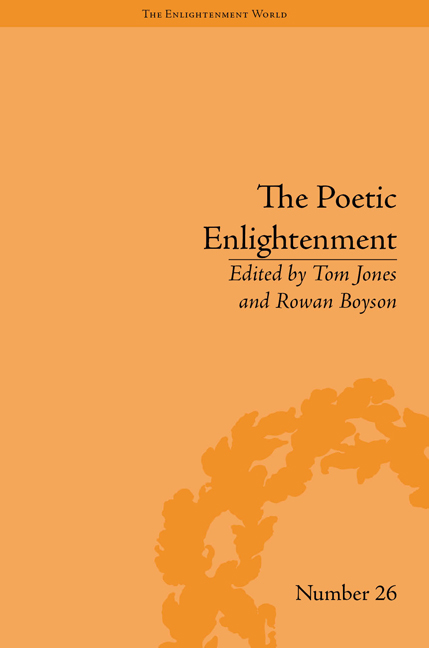Book contents
- Frontmatter
- CONTENTS
- Acknowledgements
- List of Contributors
- General Introduction
- I Poetic Knowledge and the Knowledge of Poetry
- 1 Introduction
- 2 Samuel Johnson and the Science of Literary Criticism
- 3 Prosody, Knowledge and Humanity in Enlightenment Language Science
- 4 Ferguson's School for Literature
- II Poetic Theories of the Social Self
- III Enlightenment and Romantic Poetologies
- Notes
- Index
1 - Introduction
from I - Poetic Knowledge and the Knowledge of Poetry
- Frontmatter
- CONTENTS
- Acknowledgements
- List of Contributors
- General Introduction
- I Poetic Knowledge and the Knowledge of Poetry
- 1 Introduction
- 2 Samuel Johnson and the Science of Literary Criticism
- 3 Prosody, Knowledge and Humanity in Enlightenment Language Science
- 4 Ferguson's School for Literature
- II Poetic Theories of the Social Self
- III Enlightenment and Romantic Poetologies
- Notes
- Index
Summary
The juxtaposition of poetry and knowledge highlights some of the pivotal questions raised in this book. Is poetry a legitimate sort of knowledge? Could human knowledge be embodied in poetry – and, if so, how? As the following three essays demonstrate, such questions were of utmost significance for Enlightenment authors. From the 1740s onwards, such thinkers as Etienne Bonnot de Condillac, Denis Diderot and Jean-Jacques Rousseau (among others) tended to blur the hitherto clearer boundaries between cognition and the imagination, communication and emotive persuasion, or knowledge and poetry. For example, in Rousseau's Essay on the Origin of Languages (1756–61, published in 1781) and in Robert Lowth's Lectures on the Sacred Poetry of the Hebrews (1753), the first human beings were presented as sublime poets, singing imaginative poems that expressed and communicated knowledge about their community, beliefs and the natural world.
Yet why should Enlightenment thinkers, traditionally seen as engaged mainly in clarifying the limits and tasks of human reason, turn to poetry as a genuine form of knowledge – or even its earliest and most crucial embodiment? What could poetry have contributed to the evolution of the human mind that passive perception or analytic thinking might not have achieved alone? Condillac's Essay on the Origin of Human Knowledge (1746) offers one of the most influential perspectives on the role of poetry in mid-eighteenth-century thought. The first part of the Essay is focused on the contribution of language to all higher human mental processes, arguing that we can bootstrap ourselves out of our initially passive immersion in sense data only through the self-conscious use of artificial signs (including poetic expression). Its second part is dedicated to the function of a melodious, gestural language of action in the emergence of human speech and communication.
- Type
- Chapter
- Information
- The Poetic EnlightenmentPoetry and Human Science, 1650–1820, pp. 11 - 14Publisher: Pickering & ChattoFirst published in: 2014



